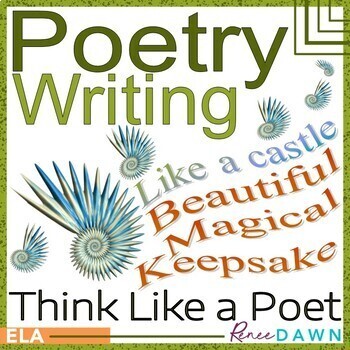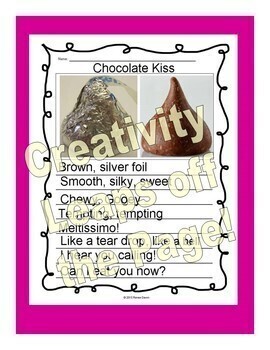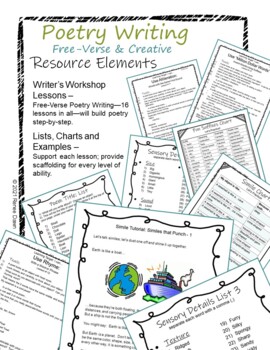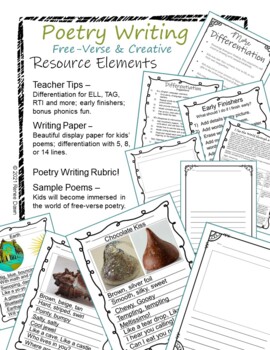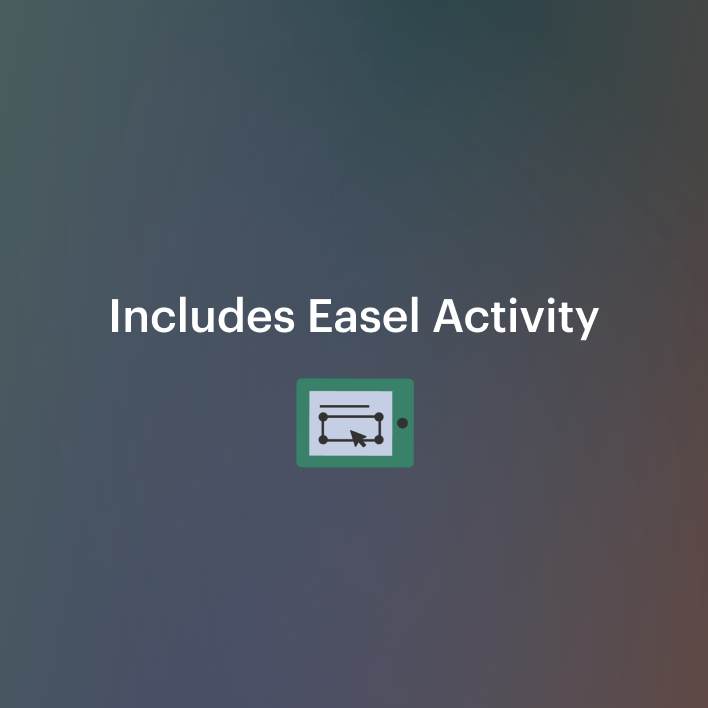Poetry Writing - Free Verse Creative - Writers Workshop Poetry Writing
- PDF
- Easel Activity
Description
Poetry writing is forever! These poetry writing lessons will help your kids to see the world through a poet’s eyes, and create beautiful free-verse poems that are dazzling display pieces. Creative, divergent thinking pops off the page.
Complete writer’s workshop lessons—16 in all—will build poetry step-by-step. Lists, charts, and examples support each lesson.
You'll teach poetic devices—sensory details, rhyme, repetition, alliteration, simile, invented language, addressing the object directly, and others—in such a way that they really "stick."
These lessons will guide every child—from kindergarten ELLs to fifth-grade TAGs—to create poems that are jazzy, profound, and fun—and maybe even life-changing.
Teach at your own pace--with strategies to...
- Write one poem per day
- Write one poem over several days or longer
- Write many poems during the month
Common Core Aligned for K – 5, with “I can…” Learning Target and CCSS on every instructional page.
NEW: For Distance Learning or Classroom Computer Work:
- Pre-formatted pages--for kids to write their poetry--with TpT's Easel Tool!
- This digital tool allows kids to type and print their text, on a computer, laptop, or tablet.
- Kids may also draw a picture to go with their text, and share it in a real or virtual classroom.
Poetry Writing is packed with these must-have treasures:
• 16 Writer’s Workshop Lessons – EXACTLY WHAT TO DO AND SAY – to teach Free-Verse Poetry step-by-step.
• You'll teach poetic devices — sensory details, rhyme, repetition, alliteration, simile, invented language, and addressing the object directly and others — in such a way that they really "stick.”
• Lessons on:
- How to find a topic
- How to create your poem from start to finish
- How to revise, edit and polish your poem so it SHINES!
- How to illustrate your poem
• Charts and Lists to support your lessons. You may open these on your SMARTboard for whole-class viewing, or open on laptops or tablets -- or print them -- for individual or small-group use.
• Tips for Differentiation, ELLs, RTIs, gifted, and older grades
• Poetry Writing Rubric -- bulletin board ready!
• Free-Verse Poetry samples, 10 in all, to immerse students in a creative mind-frame
• Poetry writing papers with a drawing box and 5 or 8 writing lines, with assorted borders or no border
• Plain lined paper with a beautiful border (with no drawing box), that children may use to extend their poetry writing
• Tech Tip: you may open this PDF on a SMARTboard for full-class viewing.
• Pre-formatted pages--for kids to write their poetry--on a computer, laptop, or tablet.
Poetry writing lessons are perfect for April, which is "Poetry Month"
...or ANY TIME you want high-interest, creative writing lessons for your students!
I hope you enjoy this Poetry Writing Resource…and if you would kindly leave your rating and feedback at
www.teacherspayteachers.com/ Poetry Writing
it would be greatly appreciated!
***** BONUS: You will get free credits to spend at TPT when you leave feedback *****
Thank you for your purchase!
© Renee Dawn
For use by one teacher per classroom; please respect the copyright.

